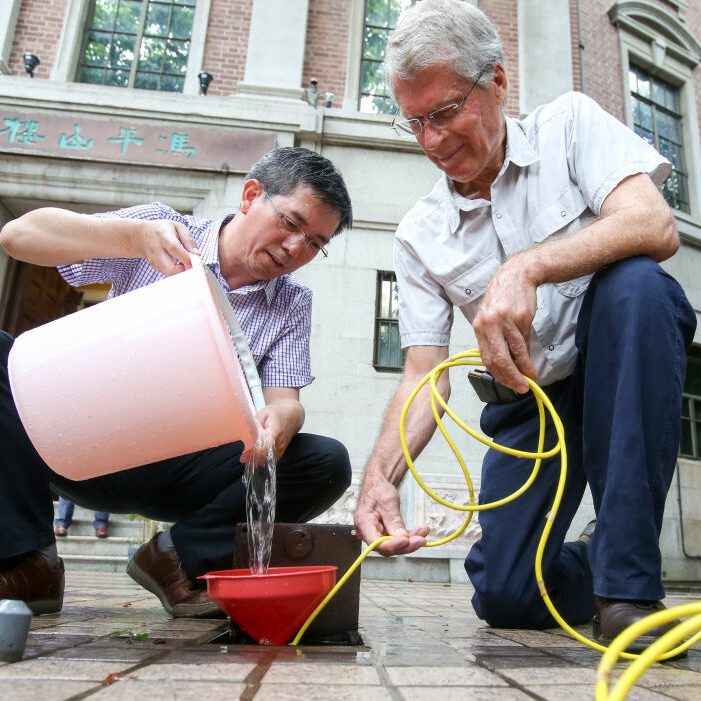Capacity Development Program
Learn more about our capacity development program, access forms and publications and find out more about our small water system technical assistance program
Capacity development is a fundamental component of the 1996 Safe Drinking Water Act (SDWA) Amendments. The SDWA Amendments provide a framework for states and water systems to work together to protect public health. The Capacity Development Program aims to reduce existing public water systems in significant non-compliance with the Federal and State Safe Drinking Water Act regulations.
Capacity Development is a process for water systems to acquire and maintain adequate technical, managerial, and financial (TMF) capacity. TMF capacity enables water systems to have the capability to consistently provide safe drinking water to the public. Besides protecting public health, communities that support their water systems are making long-term investments in sustainable communities and economic well-being.
The NJDEP is allowed to set aside up to 10% of each capitalization grant for State program management activities, which includes establishing and funding the Capacity Development Program.
TITLE TBD
TEXT TBD
Capacity Development Forms
- Financial Declaration Form for New Non-Transient Non-Community Public Water Systems
- Two-Part Pump Test Form for New Non-Transient Non-Community Public Water Systems
- Technical Manual for Determining Reliable Yield for Nontransient Noncommunity Public Water Systems
- Technical, Managerial, & Financial Capacity of New Public Community Water Systems (BSDW-PA 18)
- Technical, Managerial, & Financial Capacity of New Public Non-Community Water Systems (BSDW-PA 19)
Capacity Development Publications
Technical Assistance
This program helps public water systems serving less than 10,000 persons by 1) providing for free group training sessions, 2) conducting outreach site visits, and 3) conducting sampling that is not part of a system’s routine monitoring to detect problems or deficiencies that would otherwise go unnoticed. This was authorized by the 1996 Federal Safe Drinking Water Act, which required that States use 2% of their Federal capitalization grant from the Drinking Water State Revolving Fund to assist small water systems. Nearly two-thirds of about 600 public community water systems, and almost all of about 3,000 public non-community water systems, serve less than 10,000 persons, so there are about 3,400 small water systems in New Jersey.
DEP has contracted with the New Jersey Water Association (NJWA) to conduct free group training sessions in the Northern, Central and Southern Regions of New Jersey on such topics as Basic Accounting, Consumer Outreach, Distribution Planning and Safe Drinking Water Act Requirements, among other topics. NJWA is a non-profit association and a State affiliate of the National Rural Water Association; its membership is largely small water systems and therefore the training topics are mainly on issues affecting small water systems, but all are welcome at the training sessions. These training sessions also provide operators of small water systems with continuing education credit needed for license renewal. Registration information for training sessions is available at www.njwater.org or contact NJWA at (609) 242-7111.
- Provide technical support services to assist water systems develop:
- Technical, Managerial, & Financial (TMF) Evaluations
- Asset Management Plans (AMPs)
- Capital Improvement Plans (CIPs)
- Assess systems to identify DWSRF eligible projects.
- Assist with filling a DWSRF application Planning and design costs may or may not be covered in advance of a DWSRF loan.
- Provide technical support services to assist water systems to develop:
- Lead Service Line Inventories (LSLIs) and Plans
- Capital Improvement Plans (CIP) for Lead Replacement
- Identify LSLR projects eligible for Drinking Water State Revolving Fund (DWSRF) funding.
- Assist with filing DWSRF Application.
- Provide assistance with solicitation and outreach to stakeholders to generate interest in the SRF (State Revolving Fund) program.
- Assist with development of educational materials outlining how to apply and obtain a SRF loan.
- Coordinate with NJDEP on distribution, solicitation, and outreach to generate interest in SRF program.
